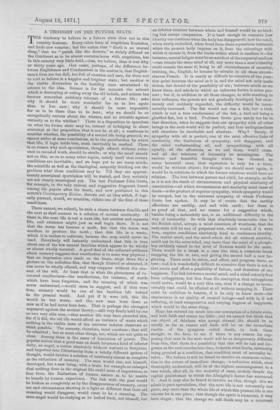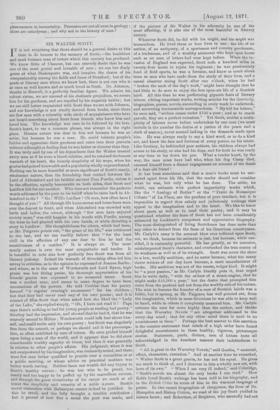A THOUGHT ON THE FUTURE STATE.
!VIE tendency to believe in a future state does not in this
country decrease. Every other form of scepticism flourishes, and finds new votaries ; but the notion that "death is an eternal sleep," that we "perish like the flowers," so widely diffused on the Continent as to be almost conterminous with scepticism, has in this country very little hold,—less, we believe, than it had fifty or thirty years ago. One cause, perhaps, of the difference be- tween Englishmen and Continentals in the matter is, that English- men's lives are too dull, too full of exertion and care, for them not to wish to believe in a happier and brighter state ; but another is the visible diminution in the hostility once entertained by -science to the idea. Science is for the moment the solvent whioh is destroying or eating away the old beliefs, and science has become somewhat suddenly tolerant of a future life ; asks Irby it should be more wonderful for us to live again than to live now ; why it should be more impossible for us to be there than to be here ; why we should be so 'energetically curious about the whence, and so irritable against curiosity as to the whither ? There is a disposition to speculate on what the future state may be, instead of indulging in silent contempt at the proposition that it can be at all ; a readiness to 'consider whether, the possibility of a second life being granted, we 'cannot arrive at some conclusions, as to the peculiarities by which that life, if logic holds true, must inevitably be marked. There is no reason why such speculation, though offered without refer- ence to revealed truth, should be sterile ; or why the mind should not on this, as on so many other topics, satisfy itself that certain 'conditions are inevitable ; and we hope yet to see many minds, the scientific as well as the theological, earnestly thinking out the iproblem what those conditions may be. Till they are approxi- mately ascertained speculation will be wasted, and they certainly are not clearly ascertained yet. The late Professor John Grote, for example, in the very curious and suggestive fragment found among his papers after his death, and now published in this month's Contemporary Review, throws out an idea which, if logi- -cally pursued, would, we conceive, violate one of the first of these -conditions.
There cannot, we submit, be such a chasm between this life and the next as shall amount to a solution of mental continuity. If -there is, the next life is not a next,life, but another and separate 'life, and existence might just as well begin there. It is not that the worm has become a moth, but that the worm was 'needless to produce the moth ; that this life is a waste, which it is useless to cultivate, because the crop could never be 'used. Everybody will instantly understand that this is true about one of the few mental faculties which appear to be wholly or almost wholly material. A good deal of the collected evidence about memory suggests that recollection is in some way physical ; that an impression once made on the brain, stops there like a picture on the collodion film, that though blurred or obscured, it .can never be wholly effaced, and may reappear without the con- -gent of the will. At least that is what the phenomena of re- 'covered recollections—the recollections, for instance, of words which have been forgotten, and the meaning of which was .never understood,—would seem to suggest, and if that were true, memory would be one of the faculties left behind tin the present world. And yet if it were loft, this life would be but waste, and the. new man born there as new as if he had never been here. That is perhaps the strongest argument against the ancient theory,—still very firmly held by one -or two very able men,—that another life may have preceded this, for if it did, the old life would afford an instance of waste which nothing in the visible laws of the universe induces observers to think possible. The memory, therefore, must continue ; that will be admitted ; but so must other things, too, which are not quite so .clear. Among these is the sense of limitation of power. The kpopular notion that a good man at death becomes a kind of inferior -deity, an angel, a notion absolutely without warrant in Scripture, -and imported into Christianity from a totally different system of thought, would involve a solution of continuity almost as complete As the extinction of memory. The man would rise, not himself, -developed, but a new being, with a brain for example so enlarged that nothing done in the original life could seem of importance, so free from the limitations of human nature as to be unable -to benefit by human experience. The link with the past would -be broken as completely as by the disappearance of memory, every act and circumstance showing in a light so different that their old meaning would disappear, would cease to be a meaning. The man-angel would be studying as he looked back, not himself, but an inferior creature between whom and himself would be no bind- ing link except compassion. It is hard enough to conceive how identity can continue when the body has disappeared; how the mind, when newly embodied, when freed from those mysterious restraints which the present body imposes on it, from the colourings with which it invests it, from the limits within which it confines it—for instance, mental fatigue must be an accident of the corporeal medium —can remain the same mind at all, any more than a man's identity could remain the same if, being in all circumstances of ancestry, • training, &o., English, he became by miracle in all those circum- stances French. It is nearly as difficult to conceive of the june- tion-point between the mind as it is, and the mind not only made sinless, but devoid of the possibility of sin ; between minds as we know them, and minds to which an unknown future is never pre- sent ; but if, in addition to all these changes, so wide-reaching in their influence, the powers are not gradually developed, but enor- mously and suddenly expanded, the difficulty would be incon- ceivably increased. The fish would not rise a fish, but a bird, which is not a true continuance of the fish, a bird not being a glorified fish, but a bird. Professor Grote goes surely too far in that direction, when he suggests that our sympathy with all other beings in the next world will be perfect, and that undisguisedness will therefore be inevitable and absolute. Why ? Surely, if sympathy with all is perfect, one of the most effective links of continuity, the limitation of sympathy, will disappear, and the mind understanding all, and sympathizing with all equally, all the affections, as we call them, would cease, and all the relations of humanity be meaningless. The ancient and beautiful thought which has cheered so many bereaved ones, that separation is only for a time, would be without object ; for though we should meet again, it would be in relations to which the former relations would have no relation. The love between parent and child, for example, so far as it is not the result of circumstances and physical similarity of constitution—all which circumstances and similarity must cease at death—is the product of superior sympathy, which sympathy would be merged, lost in the universal sympathy of which Professor Grote has spoken. It may be of course that the earthly affections are earthly, and end with earth ; but there is no proof of that, and no reason for a suggestion which, besides being a melancholy one, is an additional difficulty in the way of continuity. So with that absolutely immovable idea in the British mind, always a mind conscious of weariness, that the next state will be one of perpetual rest, which would, if it were true, require conditions absolutely fatal to continuous identity. The mortal mind, and the mind which did all without exertion, could not be the same mind, any more than the mind of a plough- boy suddenly raised to the level of Newton would be the same. There would be a break in a case like that, a conscious break snapping the life in two, and giving the second half a new be- ginning. There must be strain, and effort, and progress there, as here ; and it is wonderfully difficult to conceive that there is not in that strain and effort a possibility of failure, and therefore of un- happiness. The link between a mortal mind, and a mind notonly free from unhappiness, but free from the conception that unhappiness could arrive, would be a very thin one, even if a change so incon- ceivably vast could be effected at all without snapping it, There must be ambition in heaven, if it be only to know more—for omniscience is no quality of created beings—and with it, if not suffering, at least comparative and varying degrees of happiness, which would be the same thing.
Hope has entered too much into our conception of a future state, and both faith and reason too little ; and we cannot but think that one object of thinkers who accept eternal life should be to minify as far as reason and faith will let us the immediate results of the symptom called death, to look them straight in the face, to see if there is any reason for sup- posing that man in the next world will be so dangerously different from this, that there,is a possibility that this will be lost and for- gotten as the soul recedes into time, to decide what limits, continuity being granted as a condition, that condition must of necessity in- volve. We believe it will be found to involve an enormous reduc- tion in the extent of immediate change,--a reduction which, once thoroughly understood, will be of the highest encouragement to a race which, after all, in the majority of cases, acutely dreads the capital punishment to which the Almighty's decree has sentenced it. And it may also be found to involve an idea, though this we admit is pure speculation, that the next life is not necessarily one piece, any more than the whole life of which this present life is one minute bit is one piece ; that though the spirit is immortal, it may have stages ; that the change we call death may be a recurrent
phenomenon in immortality. Processes are not all even in geology ; there are cataclysms ; and why not in the history of man ?































 Previous page
Previous page